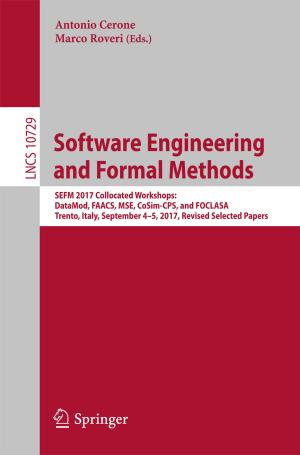The Science of Baseball
Batting, Bats, Bat-Ball Collisions, and the Flight of the Ball
Nonfiction, Science & Nature, Technology, Engineering, Mechanical, Science| Author: | A. Terry Bahill | ISBN: | 9783030030322 |
| Publisher: | Springer International Publishing | Publication: | December 4, 2018 |
| Imprint: | Springer | Language: | English |
| Author: | A. Terry Bahill |
| ISBN: | 9783030030322 |
| Publisher: | Springer International Publishing |
| Publication: | December 4, 2018 |
| Imprint: | Springer |
| Language: | English |
This augmented, new edition adds discussion of the bat’s vertical sweetness gradient, eye-hand cross-dominance, models for the swing of a bat, and accuracy of simulations. The book retains its description of dynamic collisions between baseballs, softballs, and bats, and the intricate modeling of these interactions, using only basic math and physical principles. Veteran baseball science author Terry Bahill explains models for the speed and spin of balls and bats and calculations for bat-ball collisions at a level accessible to most students of the science of baseball. Demystifying the most important factors for understanding bat performance—bat weight, moment of inertia, the coefficient of restitution, and characteristics of humans swinging the bats—Dr. Bahill also explains physical aspects of the optimal bat and the sweet spot.
Praise for the First Edition
“Dr. Bahill’s book is the perfect tool for teaching how to solve some of baseball’s basic science problems. Using only simple Newtonian principles and the conservation laws, Dr. Bahill explains how to model bat-ball collisions. Also, he derives equations governing the flight of the ball, and proceeds to show what factors affect air density and how this density affects the ball’s flight. And as a unique addition to his fine book, he provides advice for selecting the optimal bat—a surprising bonus!”
Dave Baldwin, PhD
Major League pitcher, 1966-1973, lifetime Major League ERA, 3.08
“If I were the General Manger of a baseball team, I would tell my people to write a ten-page paper describing what this book contains that could improve our performance. I think the book provides the foundation for change.”
Bruce Gissing
Executive VP-Operations (retired)
Boeing Commercial Airplanes
“[I] had a chance to read your research, and I fully agree with your findings.”
Baseball Legend Ted Williams, in a 1984 letter to the author
This augmented, new edition adds discussion of the bat’s vertical sweetness gradient, eye-hand cross-dominance, models for the swing of a bat, and accuracy of simulations. The book retains its description of dynamic collisions between baseballs, softballs, and bats, and the intricate modeling of these interactions, using only basic math and physical principles. Veteran baseball science author Terry Bahill explains models for the speed and spin of balls and bats and calculations for bat-ball collisions at a level accessible to most students of the science of baseball. Demystifying the most important factors for understanding bat performance—bat weight, moment of inertia, the coefficient of restitution, and characteristics of humans swinging the bats—Dr. Bahill also explains physical aspects of the optimal bat and the sweet spot.
Praise for the First Edition
“Dr. Bahill’s book is the perfect tool for teaching how to solve some of baseball’s basic science problems. Using only simple Newtonian principles and the conservation laws, Dr. Bahill explains how to model bat-ball collisions. Also, he derives equations governing the flight of the ball, and proceeds to show what factors affect air density and how this density affects the ball’s flight. And as a unique addition to his fine book, he provides advice for selecting the optimal bat—a surprising bonus!”
Dave Baldwin, PhD
Major League pitcher, 1966-1973, lifetime Major League ERA, 3.08
“If I were the General Manger of a baseball team, I would tell my people to write a ten-page paper describing what this book contains that could improve our performance. I think the book provides the foundation for change.”
Bruce Gissing
Executive VP-Operations (retired)
Boeing Commercial Airplanes
“[I] had a chance to read your research, and I fully agree with your findings.”
Baseball Legend Ted Williams, in a 1984 letter to the author















